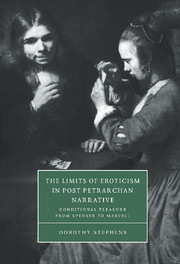6 - Caught in the act at Nun Appleton
Published online by Cambridge University Press: 22 September 2009
Summary
Andrew Marvell offers us one version of what it means for a male writer of the seventeenth century to look back at the sixteenth-century “feminine” imagination. If Spenser recognizes that one subtext of the sonnet tradition is a complex desire to flee the femininity that one has taken into oneself, Marvell makes this subtext hilariously overt. Whereas the Petrarchan sonneteer is most eloquent when he is bewailing his lady's inaccessibility, and therefore in some guilty sense most fulfilled when he is most frustrated, Marvell cheerfully trots this libidinal paradox into the light of day and grooms it for show, saying to his Petrarchan predecessors, in effect, “Fine, let's not even lament the woman's absence; let's just be eloquent. In fact, let's do whatever we can to avoid women altogether.” Marvell uses this ironic stance most obviously when the speaker of “The Garden” claims airily that gardens without women have always been better than gardens with them. With cheerful malice, he tells us that only if Adam had been a god could he have been lucky enough to keep the perfection of his initial solitude; the speaker adds that the real motivation for Apollo's pursuit of Daphne was his desire for a green laurel wreath.
“Upon Appleton House,” while not as succinctly funny with the issue, develops it more subtly and fully.
- Type
- Chapter
- Information
- The Limits of Eroticism in Post-Petrarchan NarrativeConditional Pleasure from Spenser to Marvell, pp. 178 - 209Publisher: Cambridge University PressPrint publication year: 1998



